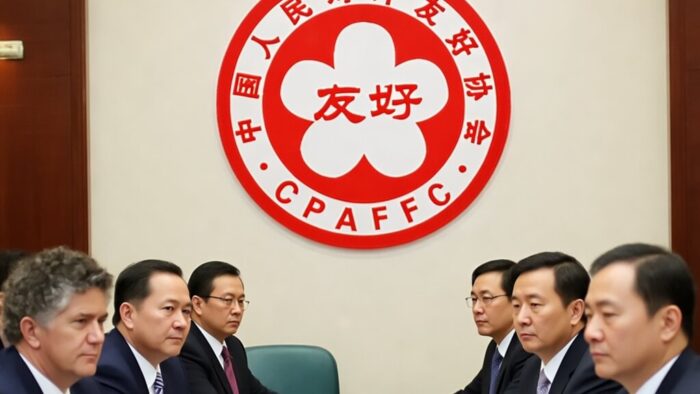Chinese influence operations in the UK have expanded beyond traditional espionage to encompass political cultivation, transnational repression, and academic infiltration. On 6 November 2025, Vision Times reported that Beijing’s intelligence efforts increasingly center on influence rather than theft, with MI5 issuing a rare interference alert accusing London-based lawyer Christine Lee of acting on behalf of the CCP’s United Front Work Department to influence Parliament by cultivating relationships with politicians early in their careers. The article begins:
For years, the British government has struggled to define the scope and nature of the security threat posed by the Chinese Communist Party (CCP). That uncertainty came into sharp focus after two British citizens — Christopher Cash and Christopher Berry — were accused of spying for Beijing, only for prosecutors to later drop the charges. The case reignited debate over whether the Official Secrets Act is outdated and exposed a deeper dilemma: How exactly does Chinese intelligence operate in today’s interconnected world, and has it already expanded far beyond traditional espionage? At one level, China’s intelligence services still rely on Cold War–style methods — using diplomats as cover, cultivating informants, and recruiting insiders within British institutions.
Key Points
- MI5 issued a rare interference alert in January 2022, accusing London-based lawyer Christine Lee of acting on behalf of the CCP’s United Front Work Department and attempting to influence Parliament by cultivating relationships with local politicians early in their careers.
- MI5 officials warned that Beijing invests in patience by embedding influence across multiple levels of government, hoping to shape politicians’ views as they rise to power through long-term cultivation of relationships.
- Beijing’s intelligence efforts increasingly center on influence rather than theft, with the real challenge lying in how Chinese intelligence fuses economic leverage, technology acquisition, and influence-building into a single strategy to shape foreign narratives.
- Former GCHQ director Ciaran Martin stated that China seeks population-level data to train artificial intelligence, analyze social behavior, and map collective vulnerabilities, extending beyond traditional espionage to mass-scale influence capabilities.
China Influence Operations in the UK: Elite Capture, Parliamentary Infiltration, and Academic Penetration
Chinese influence operations in the United Kingdom represent a sophisticated multi-layered campaign targeting British institutions through elite networks, parliamentary infiltration, academic partnerships, and digital manipulation. Security agencies publicly identified Christine Lee, a prominent London lawyer, as engaged in long-term political interference activities linked to the United Front Work Department, with MI5 warning that she facilitated over £400,000 in donations to Labour MP Barry Gardiner while her son worked in his parliamentary office.
Beyond individual agents, Beijing has cultivated institutional vehicles for influence. The 48 Group Club serves as China’s primary mechanism for elite capture in Britain, gathering former Prime Minister Tony Blair, members of the House of Lords, and senior business executives who interact with Chinese Communist Party operatives. The organization publishes content from Chinese state media outlets, with members openly advocating for Beijing’s policy objectives. Similarly, Jonathan Powell, Sir Keir Starmer’s national security adviser, held talks with the Chinese People’s Association for Friendship with Foreign Countries eight months before his government appointment, despite US security officials warning the organization was involved in foreign influence operations.
China’s influence extends into digital and academic spheres with alarming scope. The government has funded British YouTubers through Chinese Radio International to produce pro-China propaganda videos with titles like “Western media lies about China” and “Camera surveillance is great in China.” Meanwhile, UK universities have conducted nearly 1,400 joint studies with Chinese scientists in militarily sensitive fields—more than any other European nation—as part of what researchers describe as a well-thought-out strategy to advance China’s technological and military power. The United Front system operates through friendship associations and student groups that pressure university administrators to cancel visits from critics like the Dalai Lama and censor artwork critical of CCP actions in Xinjiang.
The UK’s response has been notably constrained despite documented threats. When Britain introduced its Foreign Influence Registration Scheme in January 2025, China remained conspicuously absent from the “enhanced tier” requiring comprehensive activity declarations, despite Parliament’s Intelligence and Security Committee having found in 2023 that China engaged in aggressive interference targeting British academia and politics. Conservative MPs criticized this exclusion, arguing it prioritizes economic links over national security.
External References:
- Intelligence and Security Committee of Parliament — China Report 2023
- MI5 warning about influence efforts of British-Chinese lawyer marks changed tone — France 24
- 48 Group Club — Wikipedia
Disclaimer: The Global Influence Operations Report (GIOR) utilizes AI throughout the posting process, including the generation of summaries for news items, introductions, key points, and, often, the “context” section. We recommend verifying all information before use. Additionally, all images are generated using AI and are intended solely for illustrative purposes. While they represent the events or individuals discussed, they should not be interpreted as real-world photography.









